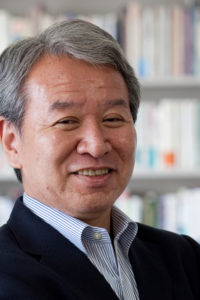Japanese “Armitage-Nye Report” Launched
With the arrival of the Trump administration came a sense of bewilderment, in the face of a new style of diplomacy unlike anything that had gone before.
Nonetheless, we need to avoid doing anything that could damage the Japan-US alliance, an important public good for stability and prosperity in East Asia.
A group of experts in Japanese diplomacy has come together to set out a proposal for both the Japanese and US administrations.

Tanaka Akihiko, President, National Graduate Institute for Policy Studies (GRIPS)
On April 5 this year, a joint research program on intellectual exchange between Japan and the United States (Mt. Fuji Dialogue), co-organized by the Japan Center for Economic Research (JCER) and the Japan Institute of International Affairs (JIIA), launched a policy proposal report entitled “Toward a Greater Alliance,” setting out a vision for Japan-US relations in the future.
The report was the result of intense deliberations by selected Japanese members of the “Mt. Fuji Dialogue” since around last summer, prompted by the sense that it was time for Japan to make constructive proposals for the future of the Japan-US alliance. This follows the classic example of the “Armitage-Nye Reports,” a set of three bipartisan policy proposals headed by Richard Armitage and Joseph Nye in the United States.
An appeal to both the Japanese and US administrations
The significance of this report has increased since deliberations started in the middle of last year as a result of two key changes in international affairs which are likely to have a serious impact on Japan.
The first of these is the establishment of the Trump administration in the United States. During the presidential election campaign, Donald Trump repeatedly made dismissive comments about the alliance built up between Japan and the United States to date. This prompted concerns amongst experts and the diplomatic authorities on both sides, given the possibility that a Trump administration might reverse the United States’ existing alliance policy. This proposal argues against such a change and underlines the “importance” of the Japan-US alliance by presenting what needs to be done to further develop the alliance to meet the current challenges. As a chair of the team, I hope that this report is to become a shared guideline for both the Japanese and US administrations.
In terms of Japan-US relations, the Trump administration has fortunately got off to a good start by continuing to adhere to the United States’ basic policy on security in the Asia-Pacific. In spite of statements regarding the United States withdrawing from the Trans-Pacific Partnership (TPP), concerns regarding trade have also been allayed to some extent by the initiation of economic dialogue headed by Deputy Prime Minister Aso Taro and Vice President Mike Pence, as a bilateral framework after the US withdrawal. With things off to a relatively good start, I hope that we can maintain this direction in the future too.
An alliance that isn’t solely based on security
The scope of this report doesn’t end there. Trump’s claims during the election campaign that there was a sense of unfairness in the alliance burden-sharing, or that the United States was losing out somehow, struck a chord with a significant number of people in the United States. In his inauguration speech too, Trump made comments to the effect that the United States had enriched other countries while losing out itself, and had protected other countries while neglecting to protect itself. Personally, I think this is a sentimental argument that is at odds with the facts. If the president continues to reveal sentiments such as these publicly however, and they are supported by a large proportion of the American people, then we need to understand where they are coming from, and be flexible enough to come up with effective policies.
I say this because I don’t believe that the Japan-US alliance is an alliance based solely on security interests. The fact that we have maintained our alliance for such a long time is because both countries value freedom and democracy, irrespective of differences in culture or customs. There is a real sense of solidarity between our two countries, based on a shared underlying respect for norms within the international community. The cornerstone of our alliance is our shared ethos, which is what makes it so valuable. That is the message Japan needs to keep on getting across to the American people. An alliance that is focused solely on immediate security concerns will crumble as soon as the environment changes. Long-term unity is what matters, over and above immediate concerns. That is why we need to take on board opinions from a wide range of sources as we continue with dialogue.
Growing geopolitical risks in East Asia
The other change in international affairs is an increase in geopolitical risks facing East Asia. In particular, Japan and the United States need to engage in serious and close discussion regarding how to put an end to nuclear and missile development in North Korea, as something that should be an absolutely priority.
Another issue that requires attention is that of Chinese assertive activities in the East China Sea and the South China Sea. Although this may not pose a direct military threat to Japan and the United States at this moment, we should start deliberations on how to strengthen defense and coast guard capabilities in the region. At the same time, we need to work towards creating an environment in which China is induced to act responsibly within the international community.
An “era of adjustment” in the liberal order
The above points are derived from an examination of international relations in the immediate neighborhood of Japan. But an examination of the global trends also encourages us to make necessary “adjustments” to the liberal world order that has established itself since World War II. We are in the midst of the significant change the world has undergone in the quarter of a century since the end of the Cold War.
Four trends are important.
Firstly, economic development is going global. East Asia in particular is experiencing rapid growth, as evidenced by a dramatic fall in the number of poor people in China, home to the world’s largest population. As a result, this is bringing about a substantial shift in the balance of international political power.
Secondly, the spread of liberal democracy is slowing down. To put it another way, the wave of democratization that swept the world from the 1980s onwards has started to come to a halt in the twenty-first century.
The third key trend is the increasing prevalence of terrorism. This is due in no small part to failed states in developing countries that have been cut off from support that they previously received from the United States or Soviet Union during the Cold War era. Terrorist organizations have capitalized on the resulting civil unrest and turmoil to expand their activities.
The fourth important change is a resurgence of geopolitical military and quasi-military behavior among authoritarian states.
However you look at it, these are enormous changes that could undermine the structure of the liberal international order. What can Japan and the United States do to make it through this “era of adjustment”? Our report offers, we hope, a constructive and concise response to this question.
Related link: The policy proposal report “Toward a Greater Alliance”
http://www.jcer.or.jp/eng/pdf/Mt.FUJI_DIALOGUE20170405report_e.pdf
Translated from “’Nihon-ban Aamiteiji / Nai Hokokusho’ no Shatei (Japanese “Armitage-Nye Report” Launched),” Gaiko (Diplomacy), Vol. 43 May/Jun., 2017 pp. 102–104. (Courtesy of Toshi Shuppan) [July 2017]




